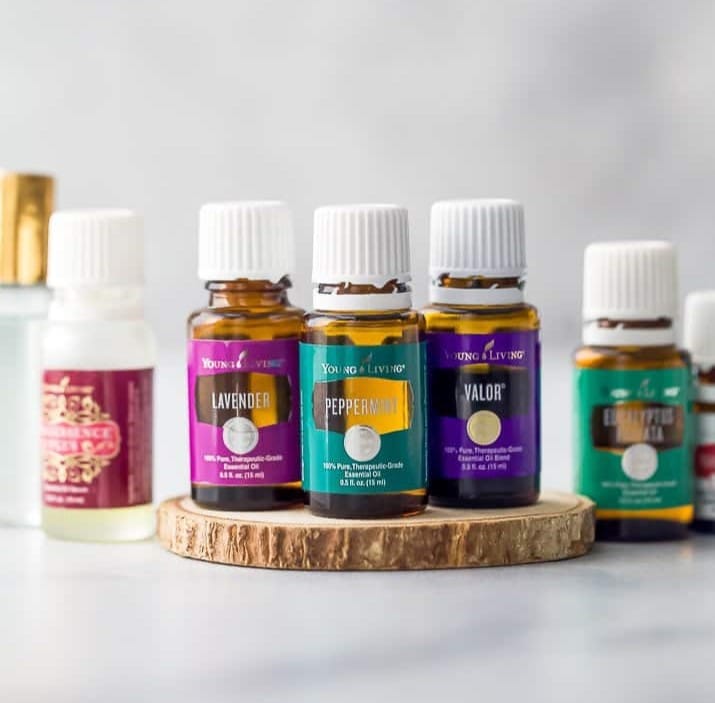Peppermint oil has been used for centuries to help with headaches, but does it work? Essential oils have been gaining popularity in recent years, and peppermint oil is one of the most popular. It has a variety of uses, from helping to relieve headaches to aiding in digestion.
But what is the science behind it? In this article, we'll take a deep dive into the science of peppermint oil and its potential benefits for headaches. We'll explore the research, the potential risks, and the best ways to use peppermint oil for headaches. So, if you're looking for a natural way to ease your headache,
What is Peppermint Oil and How Does it Help with Headaches?
Peppermint oil is a popular essential oil that has been used for centuries to treat a variety of ailments. It is derived from the peppermint plant, which is a hybrid of watermint and spearmint. The oil is extracted from the leaves and stems of the plant and is known for its strong, minty aroma. Peppermint oil has been used to treat headaches, nausea, indigestion, and other digestive issues. It is also believed to have anti-inflammatory and antispasmodic properties, which can help reduce muscle tension and pain.
When it comes to headaches, peppermint oil can be used in a variety of ways. It can be inhaled directly from the bottle, added to a diffuser, or applied topically to the temples or forehead. Inhaling the oil can help to reduce tension and pain, while topical application can help to reduce inflammation and relax the muscles. Additionally, peppermint oil can be used in combination with other essential oils, such as lavender or eucalyptus, to create a more powerful blend. This blend can be used to help reduce the intensity of a headache and provide relief.
Overall, peppermint oil is a powerful essential oil that can be used to help reduce the intensity of headaches. It has anti-inflammatory and antispasmodic properties, which can help to reduce muscle tension and pain. Additionally, it can be used in combination with other essential oils to create a more powerful blend. With its many benefits, peppermint oil is an excellent choice for those looking for natural headache relief.
Peppermint Oil: A Natural Solution for Headache Pain
Peppermint oil has been widely recognized for its ability to reduce headache pain. This essential oil contains menthol, which can relax muscles and stimulate blood flow in the area of discomfort. This potent combination of properties makes it an effective oil for headaches.
How to Use Peppermint Oil for Headache Relief
Using peppermint oil for headache relief is a natural remedy that has been gaining popularity in recent years. Peppermint oil, which is derived from the peppermint plant, contains menthol and other compounds that are believed to have medicinal properties. Studies show that it may reduce inflammation, relax muscles, and provide pain relief—all of which can help ease headaches.
To use peppermint oil for headaches, you don't need any fancy tools or techniques. First and foremost, make sure you purchase pure essential peppermint oil with no added ingredients such as preservatives or artificial fragrances. Then you can try one of these simple methods:
Try Inhaling the Oil Directly
Place one drop of the essential oil on your palm and rub your hands together briskly before bringing them close to your face to inhale deeply several times in succession. Alternatively, add a few drops of the oils into an aroma diffuser or bowl of steaming water and inhale the vapors for a few minutes daily until symptoms subside.
Massage With Oil
Mix a few drops of essential peppermint oil with 1 tablespoon of carrier oils like jojoba or coconut oil then use this mixture to massage your temples or any other areas where you experience discomfort due to headaches. For best results do this twice daily until symptoms subside.
Add The Oil To A Hot Compress
Dilute 5-6 drops with 2 cups of warm water in a bowl then soak clean cotton cloth into it before wringing out excess liquid and applying it onto the affected area such as the forehead for 10-15 minutes every day till the pain subsides significantly. However, avoid using very hot compresses as they might aggravate the pain instead. It’s important not to leave it on too long because repeated application might irritate sensitive skin.
Additionally, adding some calming activities such as deep breathing exercises, yoga poses (e.g., downward dog), stretching, guided meditations, etc would be beneficial alongside the use of aromatherapy with essential oils like peppermint, etc - all designed specifically meant to reduce stress levels which often triggers tension headaches. Follow these simple steps & say goodbye forever to those annoying headaches!
Other Essential Oils for Headaches
While peppermint oil is highly effective, it's not the only essential oil that can provide headache relief. Lavender essential oil, for instance, is known for its calming properties and can help reduce stress and anxiety, common triggers for tension-type headaches.
Eucalyptus oil is another option that can be beneficial for sinus headaches. It helps clear nasal passages, reducing the pressure and pain associated with these types of headaches. A few drops of eucalyptus oil in hot water can create a soothing steam inhalation treatment.
Chamomile essential oil, with its anti-inflammatory properties, can also help ease headache pain. Applying a few drops of this oil, perhaps mixed with a bit of carrier oil, can provide relief.
The Science Behind Essential Oils and Headaches
Scientific evidence supports the use of essential oils for headache relief. In a placebo-controlled clinical trial, peppermint oil was found to be significantly more effective than the placebo in providing acute treatment for tension-type headaches.
Moreover, a systematic review of published studies found that lavender essential oil could reduce migraine pain. Participants who inhaled lavender oil during a migraine attack experienced faster pain relief than those who did not.
Eucalyptus oil inhalation has also been shown to lower blood pressure and promote relaxation, further helping to alleviate migraine headache symptoms.
Relieves Tension Headaches:
Tension headaches occur due to stress, tight neck muscles, or a rigid posture, leaving you feeling a dull ache on both sides of your head. Peppermint oil has a cooling effect on nerve fibers, which reduces muscle contractions. Applying a few drops of peppermint oil to your temples and massaging it gently can effectively relieve tension in the muscles and alleviate headaches.
Eases Migraines:
Migraine headaches are debilitating and can be accompanied by nausea, dizziness, and sensitivity to light and sound. Peppermint oil, however, can ease the pounding pain of migraines. The oil has anti-inflammatory and numbing properties that can reduce the inflammation of blood vessels that lead to migraines. To use peppermint oil for migraines, dilute a few drops of rosemary oil in a carrier oil and apply it to the temples, forehead, and neck.
Clears Sinuses:
Many people suffer from headaches due to sinus congestion or allergies. Peppermint oil can help clear the sinuses and relieve headaches caused by these ailments. The menthol in peppermint oil is a natural decongestant that can help break up mucus and phlegm in the sinuses, allowing for easier breathing and relief from headaches.
Enhances Clarity and Concentration:
Peppermint oil can also increase mental clarity and alertness, alleviating headaches caused by tension and stress. The invigorating scent of peppermint oil can stimulate the sensory nerves in the nasal cavity, allowing the individual to focus more efficiently. The oil is known to possess a soothing effect on the mind that can help reduce headaches due to overthinking and anxiety.
Safety Considerations When Using Essential Oils
Essential oils have become increasingly popular in recent years due to their therapeutic benefits, but what many people don't realize is that there are potential safety risks associated with their use. While essential oils can offer a natural alternative to traditional medicine, it's important to understand how to use them safely.
Dilution
Essential oils are highly concentrated and can be harmful if applied directly to the skin. Diluting essential oils in a carrier oil, such as almond or jojoba oil, is key to using them safely. Always make sure to follow recommended dilution ratios, which can vary depending on the oil and the intended use best essential oils.
Allergies
Before using any new essential oil, it's important to conduct a patch test to check for any potential allergies or sensitivities. To test for any potential adverse reactions, gently apply a small amount of diluted oil to a small patch of skin, like the inside of your wrist. Allow 24 hours to pass and observe for any unfavorable responses. It's also important to research any allergies you may have before using a specific oil.
Photosensitivity
Some essential oils can cause photosensitivity, meaning that they can cause your skin to become more sensitive to the sun. Oils such as bergamot, lemon, and grapefruit should be used with caution before going outdoors, especially during the summer months. Diluting these oils and applying them to areas where the skin is covered can help reduce the risk of a reaction.
Safe Storage
Essential oils should be stored in a cool, dry place out of direct sunlight. They should also be kept out of reach from children and pets. If ingested, essential oils can be toxic and cause serious harm. Always make sure to properly close the bottle after use and avoid transferring oils into other containers that may not be safely labeled.
Safe Use
Never ingest essential oils, unless under the guidance of a qualified aromatherapist or healthcare provider. It's also important to use caution when diffusing or purchasing essential oils yourself, as prolonged exposure to concentrated oils can cause respiratory issues. Always use essential oils in a well-ventilated area, for no more than 30-60 minutes at a time, and take breaks in between diffusing sessions.


So, does peppermint oil help with headaches? The answer, backed by scientific research, is yes. However, it's not the only essential oil that can offer relief. Lavender oil, eucalyptus oil, and chamomile oil are among other effective options. Remember to use these oils safely for the best results.
Whether you're dealing with tension headaches, sinus headaches, or migraine headaches, essential oils could be a natural, effective way to manage your pain. However, always consult with a healthcare professional before starting any new treatment regimen.













